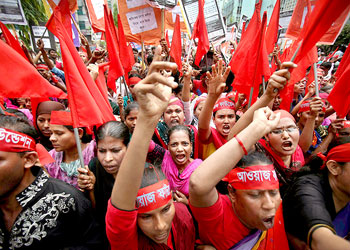In Dhaka, Bangladesh, a raucous crowd descended on the city center with signs and drums, chanting and waving banners demanding the death penalty for the owner of a factory where more than 400 people died in a building collapse last week.


In Dhaka, Bangladesh, a raucous crowd descended on the city center with signs and drums, chanting and waving banners demanding the death penalty for the owner of a factory where more than 400 people died in a building collapse last week.
In Jakarta, Indonesia, some of the tens of thousands of demonstrators marching through the city came dressed as ants –complete with bright red outfits and antennae–to depict the exploitation of workers.
And in Greece, trains, buses, and ferries sat vacant and hospitals nearly empty as thousands of public sector employees walked off the job in a one-day strike.
Each year, May 1, better known as May Day, is marked with labour rallies and strikes around the world. And this year’s holiday came at a particularly prescient moment in many parts of the world.
From Europe, where the bite of austerity has left many facing down unemployment and reduced benefits, to South and Southeast Asia, a region cluttered with precariously-built factories similar to the one that collapsed last week in Bangladesh, demonstrators gathered to vent outrage and demand reform.
"My brother has died. My sister has died. Their blood will not be valueless,” yelled one Bangladeshi protestor through a crackling loudspeaker, according to the Associated Press.
As the march wove through downtown Dhaka, rescue workers in the industrial suburb of Savar continued their search for bodies and survivors in the rubble of Rana Plaza, which collapsed suddenly on April 24 with thousands of garment workers inside.
The disaster at the factory, which manufactured clothing for several low-end Western retailers, touched off global outrage about the working conditions of garment workers across the developing world.
In Phnom Pehn, Cambodia, workers rallied for higher wages and safer working conditions.
Banned unions
In Manila, Philipines, where labour unions are banned, workers marched to demand the right to organise. And in Hong Kong, thousands turned out in support of striking dock workers, calling for wages that would help close the income gap between the country’s rich and its poor.
And that was all before Europe woke up.
There has "never been a May 1 with more reason to take to the streets,” one Spanish union leader told Reuters during a march in Madrid yesterday morning, where protestors carried signs reading "austerity ruins and kills” and "reforms are robbery.”
In the debt-laden euro zone countries of Spain, Greece, Italy and France tens of thousands of people took to the streets to demand jobs and an end to years of belt-tightening.
In Spain, where the economy has shrunk for seven consecutive quarters and unemployment stands at a record 27 percent, thousands of people snaked up Madrid’s Gran Via central shopping street carrying placards reading "austerity ruins and kills”.
"The future of Spain looks terrible; we’re going backwards with this government,” said former civil servant Alicia Candelas, 54, who has been without a job for two years.
Unions said 50,000 people marched in Madrid and more than 1 million took part in peaceful rallies across the country. There was no independent estimate, and police did not give a figure.
Conciliatory Merkel
Trains and ferries were canceled in Greece, and bank and hospital staff walked off the job after unions there called a 24-hour strike, the latest in a string of protests in a country in its sixth year of recession.
About 1,000 police officers were deployed in Athens, but the demonstration passed off peacefully, with about 5,000 striking workers, pensioners and students marching to parliament holding banners reading: "We won’t become slaves, take to the streets!”.
German Chancellor Angela Merkel, seen by many in southern Europe as the champion of the belt-tightening approach, struck a conciliatory tone, saying "budget consolidation and growth need not be contradictory”.
Letta met French President Francois Hollande on Wednesday, expecting a more favorable hearing for his focus on growth.
France’s two biggest unions, split over Hollande’s labor law reforms, held separate May 1 marches. Hollande’s approval rating has dropped as low as 25 percent as cuts bite and unemployment has risen.
German unions said about 425,000 people took part in more than 400 events around the country.
Pope condemns Dhaka slavery
Pope Francis has denounced as "slave labour” the conditions of workers caught in a deadly building collapse in Bangladesh last week. It housed several clothing factories, some supplying Western retailers.
At May Day parades in Dhaka, marchers demanded the death penalty for the building’s owner and better conditions for workers.
The Pope said he had been shocked by reports that some of the labourers had been paid just $50 a month.
"Today in the world this slavery is being committed against something beautiful that God has given us - the capacity to create, to work, to have dignity,” the Pope said at a private Mass.
"Not paying a fair wage, not giving a job because you are only looking at balance sheets, only looking to make a profit, that goes against God,” he was quoted as saying by Vatican radio.
Agencies


